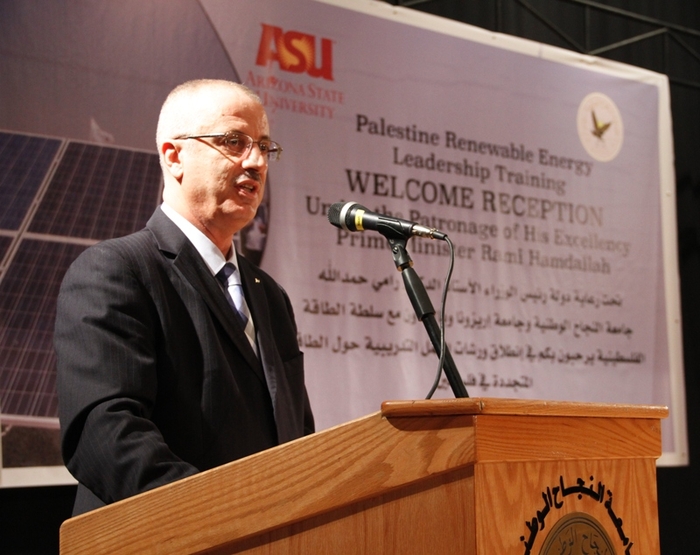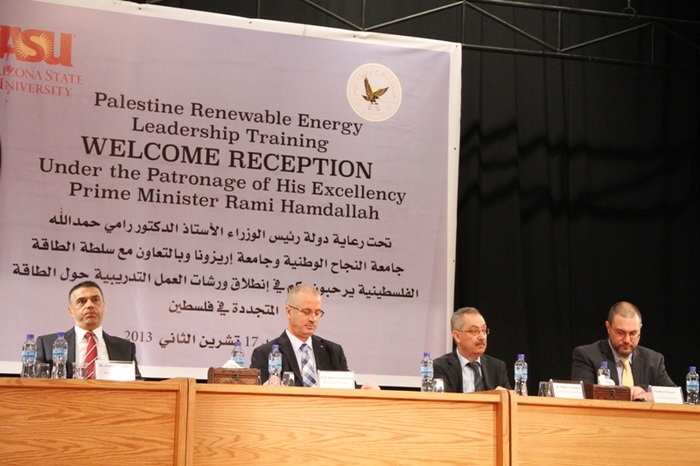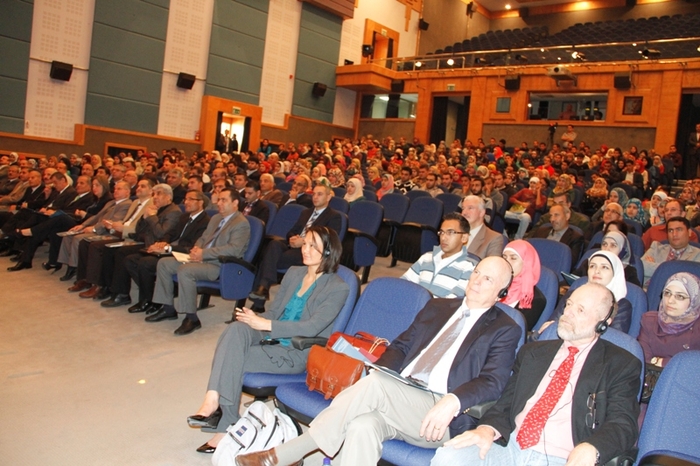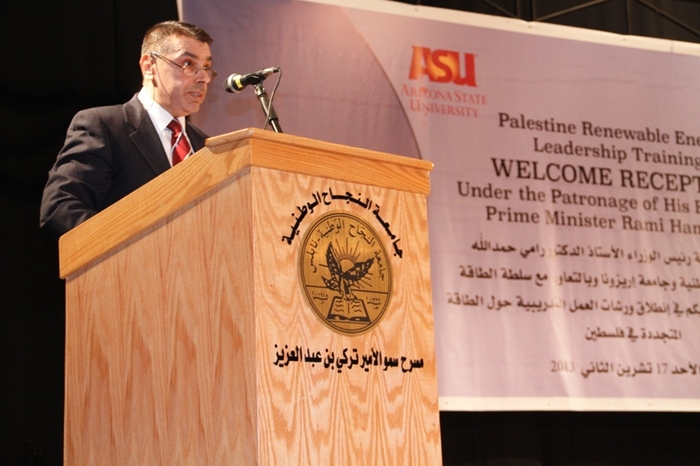The Prime Minister: We Have Come a Long Way in the Advancement of the Energy Sector, and Assuring that It Satisfies the Needs of the Palestinians.
The Prime Minister Prof. Rami Hamdallah said that Palestine has reached an important milestone in the advancement of the energy sector and assured that it meets the increasing needs of the Palestinian people, and reduces the need to buy electrical power from Israel. This milestone is thanks to the complementary roles between the public and private sectors, and to the support of friendly states.

The Prime Minister’s words came upon launching the Renewable Energy Training Program on Sunday, 17th, November 2013, where An-Najah National University and Arizona State University started its implementation in cooperation with the Palestinian Energy Authority.

The Prime Minister added that this important program aims to create qualified, well-trained leadership cadres in the field of renewable energy applications; he also noted that Palestine is facing great difficulties and harsh circumstances while pursuing the advancement of energy. One such difficulty is the risk of relying exclusively on the classic fuels; another is the occupation and Israeli control of Palestinian land, resources and people. The continuous Israeli blockade of the Gaza Strip, the restrictions imposed on the movement of goods and persons, and the closing of the border crossings hinder any possibility of trade in electricity and petroleum products between Palestine and the world.

The Prime Minister also stressed that it is very significant that Arizona State University and An-Najah University are cooperating on these workshops. An-Najah has always embraced the efforts of scientific research and technological development, and it seeks scientific centers to enrich our community with up-to-date knowledge and science. Such a goal had led to the Energy Resource Center becoming a partner of the Palestinian Energy Authority and a number of ministries and institutions.
He also added that the critical harsh reality that Palestine faces, in addition to the steadily increasing energy demands, certainly requires looking for alternatives to stimulate the national economy and address these challenges. One of these alternatives is promoting energy efficiency and advancing the renewable energy sector to produce electricity independently at a lower cost than its current rate.

The Prime Minister pointed out that the government has sought, in the framework of the renewable energy national strategy, an increasing contribution to the overall energy total equivalent to 25% by the year 2020, as well as the establishment of the Palestinian Solar Initiative to encourage investment and stimulate deployment of renewable energy technologies.
Prof. Hamdallah said that this year saw the launch of a power station through solar energy in Tubas, with support from the government of the Czech Republic; and moreover, work is under way for the establishment of two companies to generate power in Hebron and Jenin. Also, work is being done on natural gas extraction from the fields off the coast of Gaza, as the government is trying to contract with the British Petroleum Company, which was responsible for its exploration. He added that work is continuing with the aim of bestowing international biddings to extract oil in the Rantis area of western Ramallah, and working on developing mechanisms for the use of solar photovoltaic thermal power, and wind power.
The activities were launched in the Prince Turki Bin Abdul Aziz Theater in the presence of Prof. Maher Natsheh, the Acting President of An Najah University; His Excellency Dr. Omar Kattana, the President of Palestinian Energy Authority; Dr. Kherieh Rassas, the Deputy President for International and Strategic Affairs; Dr. Stephen Johnson, Vice President of Arizona University; and the working crew on the project of the two universities, in addition to hundreds of researchers and people interested in the subject of energy in Palestine.

His Excellency Dr. Omar Kattana talked about the role of the Authority in advancing the reality of renewable energy in Palestine, expressing his pride in An-Najah University’s research centers, which are a reference for researchers and scholars in the fields of energy in Palestine. He also added that Palestine is one of the first states to attach importance to the issue of renewable energy through the establishment of an environmental energy center and the implementation of many projects that encourage the investment of solar energy electricity generation and others. Additionally, he talked about the Palestinian Cabinet interest in the general strategy of energy production by the year 2020, as he referred to the achievements in the area of installing electricity generation stations.
The Deputy President for International and Strategic Affairs welcomed the Prime Minister Prof. Rami Hamdallah, Dr. Stephen Johnson and his delegation, Dr. Omar Kattana, , and all participants and attendees.

The Deputy President said that launching this project today is the culmination of the work of more than two year’s work shedding light on the importance of the development of renewable energy resources in order to improve community and environmental objectives in Palestine, in cooperation with An-Najah National University and Arizona State University, and in collaboration with the Palestinian Energy Authority. She also thanked Dr. Maen Erekat, the Palestinian Ambassador in the United States, who provided great support for the project to continue, and she thanked as well the partners of both universities who ensured the continuity of this project’s progress towards achieving its goals.
The Deputy President talked about the university’s efforts, on the premise of moral responsibility and the sound economic logic to develop the renewable energy sector. She said that innovation and research must be continuous to find the best practices in the use of endless renewable energy resources, as well as the alternatives that sponsor the effective energy sector in terms of costs – a priority of this project. In addition, she said that Palestine can increase the use of renewable energy resources and reduce current economic costs, and that the University worked on extending the population groupings with solar power, namely, Atouf and Mneizil in Hebron, along with other projects the University is working to achieve. Furthermore, she highlighted the regionally status of the Energy Resource Center.
The Deputy President concluded that: “We are optimistic, for as soon as the project is completed, it will have marked the establishment of a clearer strategic path for improving access to renewable energy resources, and this is what will also help in the development of an independent electricity supply in Palestine.”
The Arizona State University Vice President thanked An-Najah National University for its partnership with Arizona State University in an important subject for the production of renewable energy in Palestine, and pointed out that An-Najah University’s cooperation with the Palestinian Energy Authority will succeed and achieve its objectives, resulting in having an impact on the lives of people.
The targeted groups in this training are: Palestinian Energy Authority, Environment Research Center, North Electricity Distribution Company, Hebron Electric Power Company, Electricity Company, Jerusalem Electricity Company, Municipal Development and Lending Fund, Tubas Electricity Company, Salfeet Governorate, Palestinian Electricity Regulatory Council, Association of Engineers, Ministry of Local Government, Ministry of Planning, Palestinian Energy and Natural Resources, Al Kamal Company for Electrical Materials, Paltel, Southern Electricity Company, and Chamber of Commerce.



